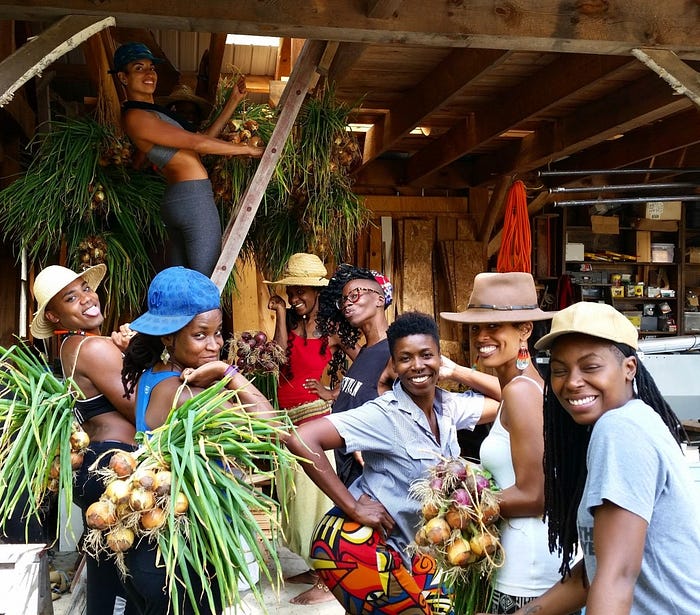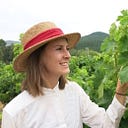Until about eight years ago, I didn’t care about farming at all. I’m embarrassed to say that I thought it was boring and backward and felt that it had nothing to do with my life whatsoever. It was only when my parents left the UK and decided to start a small farm in Chile that I began to realise how much farming affects us all.

Farmers are the planet’s key decision-makers, the people who interact most with the earth. Many of the landscapes we see in our day-to-day lives are determined by the people who farm them, and, most importantly, pretty much everything we eat and much of what we wear is sourced from a farm at some point in its lifecycle. And since food is a daily necessity, each and every one of us is intimately connected to our farmers, though nowadays our relationship to them is rarely direct.
Regenerative farming is now my career and passion; my work revolves around building ecology, profitability and beauty on farms around the world. I spend a few months each year on my parents’ farm in Chile, Vidacycle Farm, where I help experiment with different farming techniques, like mob-grazing sheep to build soil health and finding the best regenerative system for our farm. My parents started the farm because they began to understand that human health begins with a healthy farm and they wanted to work with nature’s systems to produce nourishing food and wine for people.

In the early years, we continued to tend the grape vines that were already there and planted thousands of olive trees. It was mind-boggling to me why some thrived while others died after two years of healthy growth. Everything on the farm was a complex puzzle made up of multiple interconnected ecosystems, which changed each year depending on the climate.
With farming, we learned over the course of decades, not days. Then, in 2017, a super fire engulfed the farm and killed 7,000 of our 8,000 trees. It was completely devastating both emotionally and agriculturally. Three years later, we are still about four years away from being able to make olive oil again. Our vineyard still only yields about half of what it used to.
We all find the challenges brought on by the COVID-19 pandemic difficult, but in many ways farmers live with the risks and uncertainties of total loss every year, the result of fire, flood, frost and so many other unpredictable disasters. In the UK, most farmers have subsidies to ensure they don’t go completely without, but there is no denying that in both the US and the UK, despite the risks farmers take on, we don’t celebrate their contributions to our daily lives. In fact, it’s quite the opposite: we often regard farmers and the food they produce as necessary, taking the existence of our groceries for granted. And I get it, because for many of us, in our privileged lifetimes, food has just always been there.
Up until recently, we didn’t need to engage with farmers because supermarkets had inserted themselves into the relationship as middlemen and ‘saved’ us from that reality. We thought about our food as coming from shelves, not soil.
This pandemic changed all of that. Suddenly, the supermarket shelves in the UK were empty and finding reliable sources of food became one of the most important things in our lives. Many of us decided to go back to the true source: farms and food producers.

A farmer told me how people in his local town in Cornwall, southwest England, had said for 20 years that they would come to visit him. None of them had ever made it, until suddenly two weeks ago several of them showed up almost crying with gratitude for the veg box he had harvested for them. In line with that, farm shop sales at the Sustainable Cooperative in Jersey, an island off the UK, are up by 110% week on week as locals turn to community initiatives to find their food.
Open Food Network, which provides small-scale farmers with open-source online marketplace software, is seeing a five-fold increase in its sales across the many small scale suppliers and farmers’ markets they support. Almost overnight, these smaller scale ecological food systems have gone from being ‘niche’ fantasies of a regenerative farming future to a vital source of food for many around the country!
“We have seen that when people come together, we can actually make massive changes very quickly.”
What surprised me most was how vulnerable our global supermarket food chains are and how much more nimble and responsive smaller direct supply networks have shown themselves to be. Here in the UK, small bakeries like Hamblin Bread, Landrace Bakery and Small Food Bakery have become community hubs, working with their regular producers to bring meat, vegetables and eggs previously destined for restaurants directly to their wider community.

Farmers like Jonty and Mel at Conygree Farm have set up a pop-up shop and are selling their amazing pasture-fed meat, wildflower honey and homegrown veg directly to their local community. And I was part of a group of UK volunteers who launched Farms To Feed Us, incorporating all of these producers into a searchable database so people can source their food directly from the farms that have food in good supply.
Journalist and chef Katy Severson has created a similar one for the US called Farms For The People. We have seen that when people come together, we can actually make massive changes very quickly. Suddenly, in this moment of collective grief, it has become crystal clear that food is actually one of the most valuable things in our lives.
It is at the core of our communities and our collective health, and maybe even our deepest notions of beauty. Take a second to imagine a world where we continue to support these local food producers long after this crisis is over: our hills and valleys would be filled with insane amounts of diversity, from cornflower blue, dandelion yellow and pinky red clovers to lacy white parsleys and a multitude of green hues from all the different plants eager to cover every last corner of bare soil.

The internet of fungi in the soils below would extend for miles, ensuring the plants are filled with all the nutrients they need, which in turn would mean that we could consume the most nutritious food possible. A truly 3D landscape, with trees everywhere amongst the meadows and the fields, animals helping to keep the ecosystem flowing, birds and butterflies swooping and swarming in the light of spring.
Or maybe, sadly, it is all just a phase. As soon as the play button is pressed we will forget about the alternatives and go back to our busy lives, desperate to stay afloat in a system that values productivity above all else. Our fields will continue to be doused in chemicals in order to produce commodities repackaged as food in a global supply chain. Large tin sheds will cover the valleys to house millions of pigs and chickens destined for a £1.50 supermarket sandwich.
Or maybe these moments of pause will stay with us. Maybe we’ll remember that this moment revealed a kind of humanity that could not be offered by agribusiness and giant supermarkets, but only by those directly in touch with the harvest. We’ll think back on how the regenerative farmers, bakers and producers worked tirelessly to ensure that we were all fed, that they were the real source of food when we needed it, and that actually when it comes down to it, food producers are at the core of human existence and will ultimately determine our collective future.

I originally wrote this piece for Nearness, an online magazine launched in April 2020 to gather the various responses to the changes brought on by COVID-19. Thank you to Nearness co-creator Alia Wilhelm for taking the time to edit this piece. The piece was later re-posted on Atlas of the Future, thank you to Lisa at Atlas of the Future for pulling together the images you see here.
